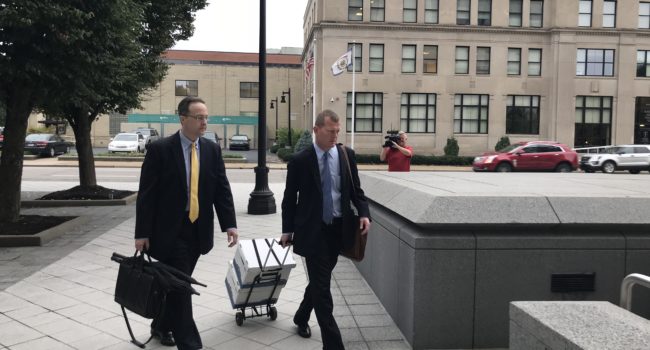CHARLESTON — Two witnesses at the federal trial of West Virginia Supreme Court Justice Allen Loughry described his use of state vehicles, but from very different points of view.
Most of the charges against Loughry are allegations that he used state vehicles and state purchasing cards for personal travel — including to conferences where he was reimbursed by the hosts, to signings for his political ethics book and to Parsons, his hometown.
Deborah Rada, who said she lives across the street from Loughry on Charleston’s Scenic Drive, testified Monday that Loughry would regularly bring home marked state vehicles.
“It was on a regular basis,” Rada said. “I would see them a lot on weekends and holidays.”
Rada, who said she is often out working in her flower bed or walking her dog, noticed other details about Loughry’s use of the vehicles.
“Over the holidays, it wasn’t unusual to see he and his wife putting their luggage in the car,” she said, adding that sometimes she saw wrapped Christmas gifts being placed in the state vehicle.
Another witness, Kevin Horan of the Federal Bureau of Investigation, had a much more technical approach.
Horan works for the bureau’s Cellular Analysis Survey Team, which analyzes data from when calls or text messages pass through cell towers. He said those hits allow analysts to determine when the cell phone user was in a general area.
“What it’s telling me is who you’re calling, how often you’re calling, the length of your calls, where you are,” Horan said. “There’s a lot of good information we can learn from these records.”
In Loughry’s case, Horan testified date by date about some locations indicating where calls and texts were placed from the justice’s phone. One location frequently mentioned was Parsons, Loughry’s hometown in Tucker County.
More testimony about data came from Jim Powers, an investigator from the Legislature’s Commission on Special Investigations.
Before Powers began his Monday testimony, U.S. District Judge John Copenhaver suggested that lawyers, jurors and others in the courtroom get up to stretch.
Federal prosecutors had already warned jurors that the nature of some testimony was inescapably detailed.
Powers testified about a spreadsheet he had constructed, using entries from Loughry’s work calendar, the court vehicle reservation log system, EZ Pass transponder data, fuel card invoices and charges from Loughry’s personal credit card.
By constructing the spreadsheet, Powers testified that he was able to get a better idea of the dates and circumstances of Loughry’s travel.
One more Monday morning witness testified that Loughry himself set the wheels in motion for a federal investigation.
Carol Casto, who retired early this year from the U.S. Attorney’s Office, testified that when she led the office for a year on an interim basis Loughry called her with misgivings about Supreme Court spending.
Casto said she took Loughry’s call immediately and handed her notes over to the agency’s criminal investigations chief.
“He ad concerns about the abuse of power at the court and what he regarded as improper spending,” Casto testified.
She added, “His primary concerns were about what he characterized as excess spending on the remodeling projects.”
Earlier in the trial, an FBI agent testified that he began to look into Loughry’s claims but the evidence — particularly relating to use of state vehicles — soon led to Loughry himself.
This is the fourth day of testimony in Loughry’s trial. Even though Columbus Day is a federal holiday, Judge Copenhaver opted to hear witnesses.




